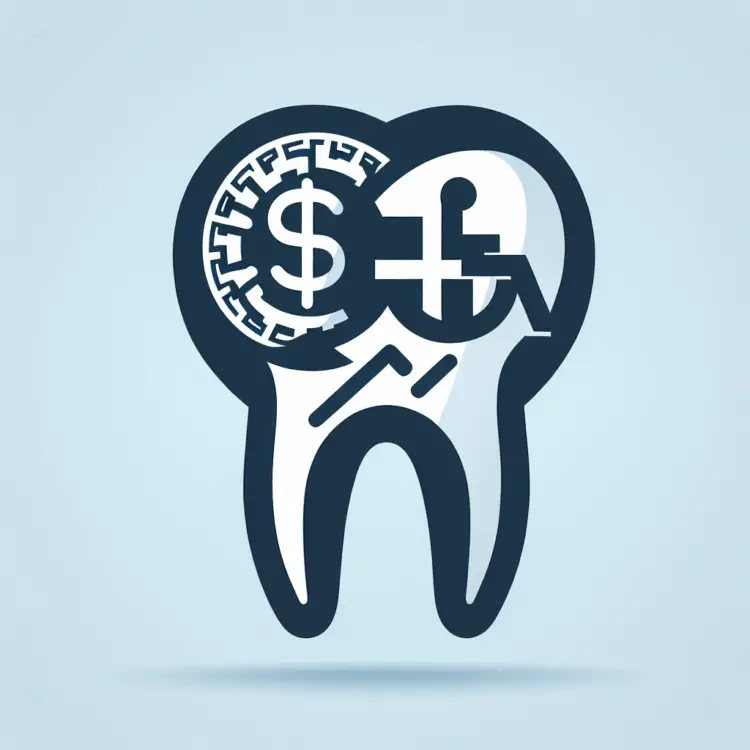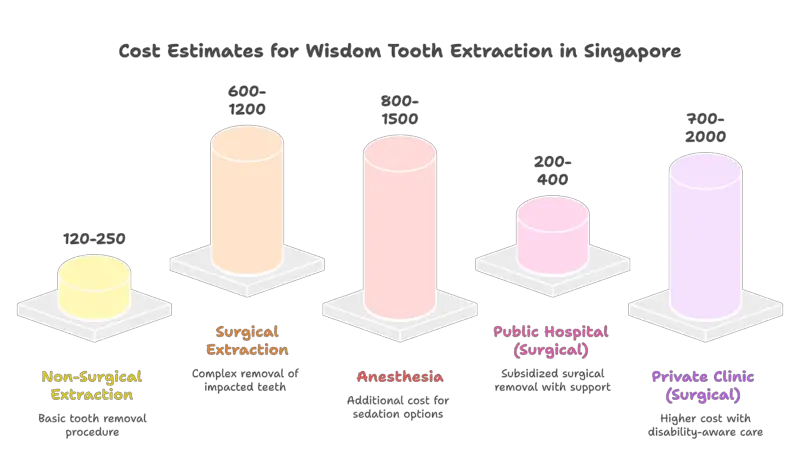Wisdom Tooth Removal Cost for Disabled Patients in Singapore

Save Money on Wisdom Tooth Extraction: Know the Costs Upfront For Persons With Disabilities
When someone with a disability needs a wisdom tooth extraction, the concern isn’t just the dental procedure itself—it’s also how much it will cost, and how accessible the process is. Understanding the wisdom tooth extraction cost is essential, especially since the experience may require additional care, support, or sedation. Whether you’re planning for yourself or supporting a family member with disabilities, knowing the financial and practical sides of the procedure helps you avoid surprises and seek appropriate care.
Removing a wisdom tooth may demand special considerations, such as wheelchair-friendly clinics, extended appointment times, or alternative anesthesia methods. Costs may vary depending on these factors, as well as whether the clinic participates in subsidy schemes. This article explores what affects the cost, how to prepare as a caregiver or patient, and what options are available in Singapore, both in public facilities and private clinics.
Why Extract Wisdom Teeth May Be More Complex for Disabled Patients
Wisdom teeth often cause pain, infection, or crowding—even more so if the patient has difficulty communicating discomfort or maintaining oral hygiene. In some cases, teeth are partially embedded or impacted, making removal more difficult. If the patient has limited mobility, sensory sensitivities, or medical complications, the procedure may require adaptive support or sedation beyond the usual protocols.
These special needs can influence costs, scheduling, and recovery planning. Clinics equipped for accessible care may charge more, though they offer the confidence of safety, dignity, and smoother experience.

What Drives Wisdom Tooth Extraction Cost for Persons With Disabilities?
The total cost depends on several intersecting factors tailored to each patient’s condition and support needs.
The complexity of the extraction is one piece—the same as for any patient. But for a person with disabilities, additional components might be necessary. An impacted tooth may take longer to extract, while sensory-sensitive patients might need sedation or a quieter, distraction-minimised environment.
Clinic accessibility matters too. A facility that supports wheelchair access, patient escorts, or extra time for communication may charge more. Some private clinics offer personalized care, which can increase the cost compared to public hospitals that may not provide the same level of accommodation.
Type of anesthesia is another factor. A patient with certain disabilities may require IV sedation or general anesthesia, beyond the local anesthesia typical in straightforward extractions. That choice adds to both the procedure cost and recovery support.
Finally, subsidy eligibility can significantly reduce out-of-pocket expenses. Persons with registered disabilities in Singapore may qualify for CHAS or subsidized care in public institutions, especially when surgical procedures are involved.
How Singapore Handles Extraction Costs for Disabled Patients
Singapore offers both public and private paths to wisdom tooth removal—each with different pricing structures and support options. Public facilities often offer subsidized care under CHAS or MediSave for surgical cases. Many hospitals have teams trained in dental care for individuals with disabilities, ensuring a safer and more supportive environment.
Private clinics frequently deliver a more accommodating experience with shorter wait times and personalized appointments. While they tend to be more expensive, some are experienced with disabilities and offer sedation or extended consultation packages.
Parents or caregivers should evaluate both settings based on overall needs, not just price—things like physical access, communication style, and ability to accommodate sensory or cognitive considerations also matter.
What Might the Actual Extraction Cost Look Like?

The typical cost ranges may change for persons with disabilities, but here’s a realistic estimate based on procedure type and care setting:
A non-surgical extraction might cost between SGD $120 and $250 per tooth. If the tooth is impacted and requires surgical extraction, you may pay SGD $600 to $1,200 per tooth. Anesthesia beyond local numbing—such as IV sedation or general anesthesia—can add SGD $800 to $1,500.
In a public hospital with disability support and subsidy, a surgical removal may cost only SGD $200 to $400 after applicable CHAS or MediSave support. Private clinics offering disability-aware care could charge between SGD $700 and $2,000 or more depending on sedation and added support.
Balancing Cost and Care: What Families Consider
Families and caregivers coordinating care for a person with disabilities often weigh multiple factors. Beyond financial planning, they consider accessibility, anxiety reduction, effective communication, and recovery support. Scheduling surgeries during quieter clinic hours—or when extra staff assistance is available—can improve the experience.
Bundled packages help caregivers avoid unexpected charges. In private facilities that offer disability-sensitive care, these packages may include access arrangements, sedation preparation, follow-up calls, or even transport coordination.
Rather than choosing the lowest-cost option, many families prioritize support and clarity, ensuring the procedure is safe and dignified for the patient.
Cost Comparison Table (Approximate)
| Procedure & Setting | Estimated Cost (SGD) |
| Simple extraction (non-surgical) | $120 – $250 |
| Surgical extraction (impacted) | $600 – $1,200 |
| IV Sedation or General Anesthesia | + $800 – $1,500 |
| Public Clinic with Disability Support | $200 – $400 after subsidy |
| Private Disability‑Aware Clinic (Package) | $700 – $2,000+ |
These are rough estimates; always obtain a customized quote based on the patient’s needs and clinic practices.
Final Thoughts: Prioritize Comfort, Not Just Cost
Wisdom tooth extraction for a person with disabilities requires thoughtful planning, not just budget comparison. While wisdom tooth extraction cost ranges can guide expectations, families should also assess clinic accessibility, communication methods, and emotional support.
Prioritize quality care that treats patients with dignity and accommodations. Clinics like Nuffield Dental are recognized in Singapore for patient-first, transparent care—partnering with families to support patients with complex needs while delivering high-quality clinical outcomes.
Arm yourself with information, ask questions early, and plan carefully—you’ll navigate the process confidently and compassionately.
Frequently Asked Questions
Can CHAS or MediSave Be Used for Wisdom Tooth Extraction?
Yes—when the extraction is classified as a surgical procedure (for impacted teeth), MediSave and CHAS subsidies can apply, even for persons with disabilities. Simple extractions without surgery are not covered.
How Do Clinics Accommodate Patients With Disabilities?
Some clinics provide extended appointment times, quiet rooms, wheelchair ramps, communication aids, and specialized sedation plans. Discuss specific needs during booking to ensure accommodations.
Is Sedation Safe for Patients With Disabilities?
Sedation can provide safe pain and anxiety control for patients who cannot easily tolerate dental treatment. Dentists collaborate with anesthesiologists and monitor vital signs closely. Inform the clinic about any medical condition or medication before treatment.
How Long Is the Recovery Period?
Recovery tends to be similar to other patients—around 3 to 7 days for simple extractions. For surgical cases or if sedation was used, healing may take up to a week. Caregivers should monitor for swelling, pain, and ensure hydration and nutrition support.
How Can I Ease Dental Anxiety?
Discuss anxiety or sensory issues with your dentist beforehand. Using calming techniques—soft lighting, music, distraction tools—or sedation can help. Reputable clinics that focus on patient comfort will adapt procedures accordingly.